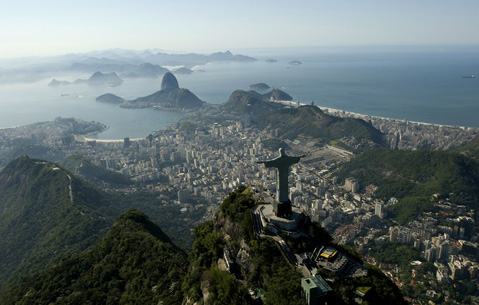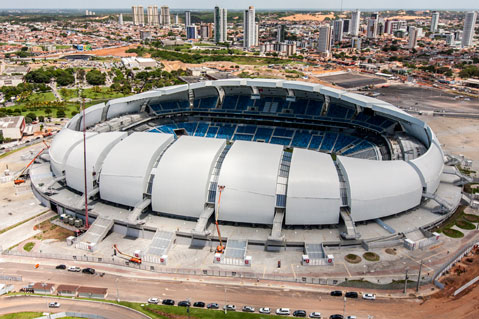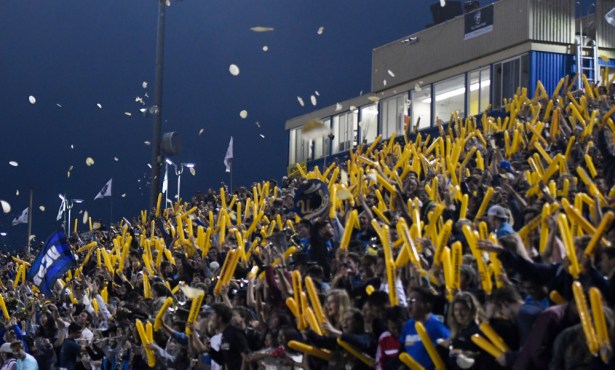Watching World Cup with Santa Barbara Eyes
Native Santa Barbarian Recently Moved to Rio, Offers Front Row Seats to Soccer Showdown

I’m a Santa Barbara native — born at Cottage Hospital, grew up on the Westside, off Mission Street — but in 2013, I spent half of the year traveling around the world in search of new experiences that the “Santa Barbara Bubble” couldn’t provide. I sold nearly all of my possessions and used my savings to buy a round-the-world plane ticket, which took me to 13 countries covering five continents. Brazil was one of those 13 countries.
When my plane touched down in LAX last November, marking the end of my massive six-month journey, I decided to take on a new challenge: complete assimilation. So I moved back in with my parents and spent every day from November 9 to February 21 planning my move to Rio de Janeiro. I got certified to teach English as a foreign language, studied Brazilian Portuguese with Rosetta Stone, and donated the little I had left.
Four months later, I am living in a small apartment one block away from Ipanema beach, working as an English teacher and freelance journalist. With World Cup now exploding all around me, my next mission is to share what it’s like for a Santa Barbarian to witness the Brazilian way of life in Rio.

American Fandom
Being an American soccer fan is not easy in Brazil. The sport started to become popular in the United States during the 1970s when the New York Cosmos signed a contract with the Brazilian athlete, Edson Arantes do Nascimento, better known as Pelé, regarded by many as the best player of all time.
Brazilians love soccer. It is a national passion, almost like a religion. The country has been world champion five times, and this year may be its sixth. Citizens of countries that do not have tradition in this multibillion-dollar sport, such as the U.S., sometimes have to face “friendly jokes” on the eve of the matches. That’s just part of the game.
Colorado-born Karen McAdams knows what it means to be a newcomer in the soccer world. The 18-year-old American student has come to Rio de Janeiro to be a part of this “magical moment.” Staying at her Brazilian friend’s house, McAdams says that it is already a great experience. “They are crazy for soccer and love to poke fun at us Americans and say we don’t stand a chance, but I always remind them that the American girls soccer team is first in the world by the FIFA Women’s World Rankings,” she said, while wearing an American jersey. “Our boys can surprise.”
Chris Kudialis, 23, from Michigan, is a journalist covering the American games. This Monday, he will watch and report as the U.S. plays their first game against Ghana in the city of Natal, located in the Northeast of Brazil.
“It’s an incredible feeling,” he said. “There’s so much unknown to the whole experience and that’s what makes it great. There’s a great amount of opportunity here, and I’m grateful for the chance to be a part of it. As an American, I’m optimistic the States are going to be competitive in the World Cup’s most difficult group. I think they’re a young and scrappy team, fresh enough to outplay Ghana and tie with either Portugal or Germany. I think they’ll need some luck to make it out of the group stage, but there’s definitely a chance.”
Safety Concerns
The U.S. Embassy in Brazil has laid out some key safety tips for American World Cup travelers such as not wearing expensive jewelry and carrying large sums of cash. The Brazilian government’s spokesperson, Fernando Thompson, also issued his own warnings. “We have our own problems,” he explained. “We have violence with drug dealers, but the point is, if you don’t want to face this kind of problem, don’t go to the dangerous places. When I am in New York, I don’t go to the Bronx. Rio de Janeiro is safer than Manhattan. You must know where not to go. Information is the key to keep you safe. I’m not saying that we have solved our problems, unfortunately not. Rio de Janeiro is safer than it was 10 years ago.”
National Protests
Brazil’s support for the World Cup within its borders is not equivalent to the love they carry in their hearts for the sport. The $3.5 billion spent by the Brazilian government on stadiums have outraged the citizens of this giant South American country, which lacks proper health care, education, and infrastructure.

During the opening ceremony of the tournament in Sao Paulo, Brazilian President Dilma Rousseff was loudly booed by tens of thousands of spectators. The soccer fans also chanted profanities at her, sitting in a skybox at the stadium. For the first time in history, a president of a hosting country did not address a speech at the opening event.
New Yorker Harold Emert knows exactly what this feeling means. He has lived in Rio de Janeiro for the last 41 years. He and his Brazilian wife reside in an apartment high-rise just off Copacabana beach. “The Brazilian people have seen billions spent on this tournament, while hospitals and schools remain unchanged,” he said. “People are suddenly complaining. There have been a lot of protests and riots. The city of Sao Paulo is more violent than here in Rio de Janeiro. The government has done a good job with security; I’ve never seen so many police out on the streets.”
The city streets did not explode with celebration after Brazil won the opening game against Croatia 3-1. The world-famous neighborhood Copacabana located in the South Zone of Rio remained empty. The majority of people occupying the roads were armed guards and small groups of protesters.
The Brazilian government claims its large investment will produce $13 billion in revenue and boost the country’s GDP.
Stay tuned for more World Cup reports as the games go on.



